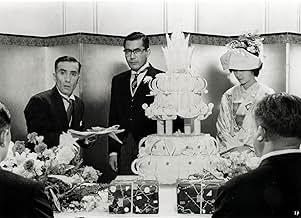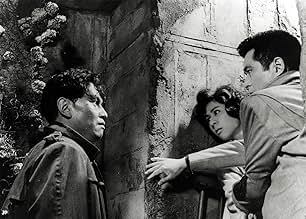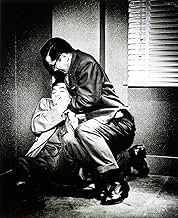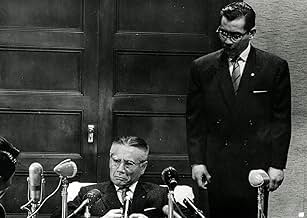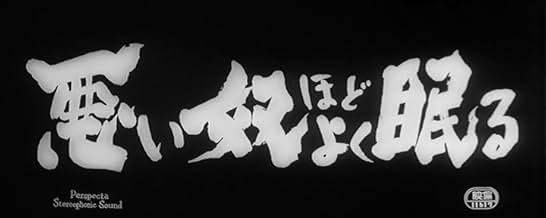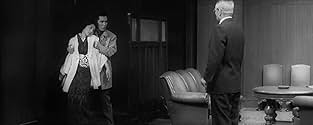Decidido a vengar la muerte de su padre que se ha suicidado ante un escándalo de corrupción empresarial, Nishi enamora a la hija del dueño de la empresa y en el día de la boda se prepara par... Leer todoDecidido a vengar la muerte de su padre que se ha suicidado ante un escándalo de corrupción empresarial, Nishi enamora a la hija del dueño de la empresa y en el día de la boda se prepara para desenmascarar a los culpables.Decidido a vengar la muerte de su padre que se ha suicidado ante un escándalo de corrupción empresarial, Nishi enamora a la hija del dueño de la empresa y en el día de la boda se prepara para desenmascarar a los culpables.
- Dirección
- Guionistas
- Elenco
- Premios
- 3 premios ganados y 1 nominación en total
Opiniones destacadas
Yes, it's "Hamlet," though in a subtle, understated, Japanese way. Some of the characters are left out, but you'll eventually spot the Prince, Horatio, Ophelia, and Claudius. However, unlike his "Macbeth" ("Throne of Blood"), this is only a partial transposition and Kurosawa wisely does not carry the parallels too far.
Although it takes patience, the picture has its rewards. The performances are good, especially Masayuki Mori as the reptilian manipulator Iwabuchi, Kamatari Fujiwara as the hapless accountant Wada, and, as always, Takashi Shimura as master bureaucrat Moriyama. The sharp black-and-white cinematography gives the film a photo-journal aura of authenticity. And Masaru Sato's wonderful opening theme, heavy with menace and unease, certainly sets an appropriate tone.
Toshiro Mifune as Nishi/Hamlet is unusually restrained here, his normal fire largely internalized. He's adequate, but this casting against type doesn't really suit him.
"The Bad Sleep Well" is Kurosawa's attack on Japan's post-war business corruption that apparently was endemic by 1960 and perhaps still is today. His critique is harsh and unsparing, though one can't help but get the feeling that he's shooting at fish in a barrel.
Beyond the corruption of the corporate scandal, which the film literally headlines, is a strong sense of inner decay. Nearly everyone, regardless of their position, is uncomfortable. Even Iwabuchi, for all his power, must answer awkwardly to greater, unseen forces. Only the jackal-journalists who cover the opening wedding banquet seem immune to the pervasive uneasiness.
Yet all, save Nishi, are prepared to accept this state of affairs in return for their security. Ironically, Nishi himself seems most comfortable in an old air raid shelter in the ruins of a munitions plant, his own "castle", as it were, where he fights for honor as he understands it.
Recommended for Kurosawa fans and anyone interested in Japanese psyche, culture, or style. Those expecting a slam-bang 1940s Warner Brothers treatment will be extremely disappointed and probably won't last an hour.
The story begins with a masterly curated wedding sequence that aptly introduces all the relevant characters, and paves its foundation by letting the news reporters provide background details about each through their gossips. The revenge plan is already in motion when the film starts, and that scene does well to bring us up to date.
The set pieces are refined, detailed & beautifully lit while the fluid camerawork & crisp greyscale photography provide the imagery its rich intensity & timeless flair. Editing is carried out well for the most part but pacing does slip a little before the third act. All the actors play their roles responsibly, plus it's got Takashi Shimura in a rare villainous role.
Overall, The Bad Sleep Well finds Akira Kurosawa in complete control of his craft, and is yet another quality addition to the legendary auteur's oeuvre. Maintaining its firm grip on audience, the film is tense, captivating & thrilling for the majority of its 151 mins runtime before culminating with an ending that hits close to real-life. In short, an underrated & underseen gem.
The film begins with a long but funny wedding sequence that illustrates Kurosawa's great skill as a director. We (and the camera) are among a group of reporters discussing the numerous convenient reasons for the marriage; the bride is lame and the daughter of Iwabuchi, the head of corporation, and the bridegroom, Nishi, has aspirations to elevate his status in the business. We see the comedy of manners play out in this sequence in increasingly humorous situations as the various parties deny the rumors and reporters continue comment to each other, culminating in the panicked looks on the faces of the corporate higher-ups as the wedding cake arrives - in the shape of their office building, Public Corp., with a red X marking a spot in one of the windows where one of their former partners committed suicide. It's a virtuoso sequence that perfectly sets up the tone of the rest of the film.
The newspapers have a field day with this, especially when various members of Public Corp. are investigated for fraud and embezzlement, yet they stoically remain silent and the case goes nowhere. Then it heats up again as a few of them commit suicide; the rumors are that they were goaded into doing so (n fact, they were). However, without any substance to press the matter, the case is dropped. And that's when the real story begins - one of the Public Corp executives, Wada, survives and is rescued by Nishi and his shadowy accomplice, Itakura.
This is followed by a brilliant scene in which Wada is taken to his own funeral and observes the farce - all the while, Nishi plays him a tape with Moriyama and Shirai, his former partners, plotting his murder. The way Kurosawa stages this is masterful; the sublime music emanating from the funeral is contrasted dramatically with the cold-blooded words of Public Corp, as Wada listens on. One of the ways Wada contributes is to scare the living hell out of Shirai - Wada poses as a ghost of himself in order to freak him out (a clever method of adding in the ghost in Hamlet). As the plot progresses, Nishi reveals his reasons for saving Wada and exacting a very personal revenge on Iwabuchi and his cohorts; and the story's pace becomes more frantic and exciting with a dramatic but sudden conclusion.
Technically, Kurosawa is at his best here. The wedding and the funeral are both marvels of observational behavior and they contrast each other perfectly. He uses a lot of intriguing mise-en-scene compositions for his interiors that serve to highlight his characters' inner thoughts but very little movement of the camera in order to manipulate his audience; the dark nature of the story is enough to suck you in. One of the fascinating observations in "The Bad Sleep Well" is that nearly all of the characters are morally bankrupt and filled with secrets - even Nishi, the protagonist. His wife, the Ophelia character, is the only one that Kurosawa allows us to feel sympathy for, and even then in the end she is not fully spared her grief. Taken in this context, Kurosawa's Hamlet becomes a study in the morality and pragmatism of revenge but also an incisive jab at the fat cats in modern Japan.
If there is a flaw in the film, it is that the overall pacing is not always brisk enough to sustain the long running time (2 1/2 hours). The wedding, despite being absolutely essential, is protracted; the rest of the film is much quicker but still drags in parts. Also, Kurosawa seems unsure about his ending; the film ends quite abruptly but appropriately in terms of his larger point about the hopelessness of fighting the rampant corruption, I would argue. However, despite these flaws, overall "The Bad Sleep Well" is a masterful and dark excursion into the seedy side of corporate crime, using Shakespeare Hamlet brilliantly but not completely as it's core. Toshiro Mifune in particular gives one of his most unique low-key performances; instead of his usual fiery exterior we get a performance full of internalized anger throughout. Highly recommended.
¿Sabías que…?
- TriviaThe ideas for the film came from Akira Kurosawa's nephew, Mike Y. Inoue, who wanted to be a scriptwriter and was giving his scripts to his uncle. Kurosawa liked it and made suggestions, to which Inoue spent six months rewriting the script under the title "Bad Men's Prosperity." Kurosawa, along with several others, reworked it even more into the final version, though Inoue did not receive screen credit.
- ErroresWhen Nishi is trying to push Shirai out of the window, the brick wall outside of the window moves around - a lot.
- Citas
Koichi Nishi: It's not easy hating evil. You have to stoke your own fury until you become evil yourself.
- Versiones alternativasOriginally released at 151 in Japan; USA version removes 16 minutes of footage.
- ConexionesFeatured in WatchMojo: Top 10 Movies You Didn't Know Borrowed from Shakespeare (2016)
- Bandas sonorasBridal Chorus
(uncredited)
from "Lohengrin"
Music by Richard Wagner
Played at the end of the wedding ceremony
Selecciones populares
- How long is The Bad Sleep Well?Con tecnología de Alexa
Detalles
Taquilla
- Presupuesto
- JPY 82,540,000 (estimado)
- Total en EE. UU. y Canadá
- USD 46,808
- Fin de semana de estreno en EE. UU. y Canadá
- USD 15,942
- 28 jul 2002
- Total a nivel mundial
- USD 47,023
- Tiempo de ejecución2 horas 31 minutos
- Color
- Relación de aspecto
- 2.35 : 1


